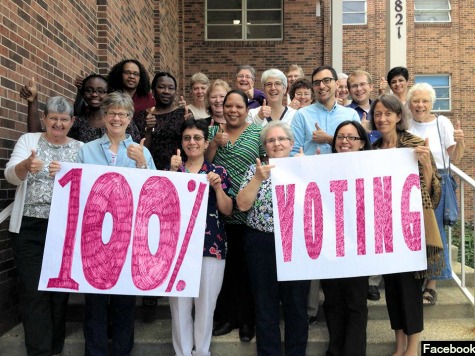The Sisters of Mercy of Silver Spring, Maryland, have released a 2014 midterm election guide that urges voters to favor candidates who support amnesty, climate change, gun control, and Pentagon budget cuts.
The election guide states:
As sisters, associates, companions, co-workers, students, volunteers and friends of the Sisters of Mercy, we have an opportunity and a responsibility to vote for those candidates who share our concern for people who suffer from poverty, sickness and lack of education; candidates who share the Sisters of Mercy’s Critical Concerns of Earth, immigration, nonviolence, racism and women. While this is not a presidential election year, the voice of Mercy is needed to inject compassion into conversations on policy and on national priorities during Senate, congressional, state and local races that will shape our nation for years to come.
“We are called to vote for those who are equally scandalized by these ills and who have a vision for addressing them,” the Sisters write. “And we are called to help shape that vision.”
The nuns’ election guide is geared to “U.S. residents,” rather than “U.S. citizens,” and it features a series of questions that the nuns say “will help those U.S. residents listen to candidates with an ear attuned to the Sisters of Mercy’s over-arching mission.”
The Sisters’ questions address how candidates address the “need for poverty reduction programs,” or welfare programs, what they refer to as “the wealth gap,” and the federal minimum wage. They also emphasize the Obama administration’s talking point that 8 million people have enrolled in the healthcare exchanges created by the new law.
Regarding climate change, the Sisters of Mercy suggest voters should note whether candidates speak about the issue with “urgency.”
“How will the candidates work with the world community to address climate change, the impact of mining, the loss of important ecosystems and biodiversity, and the human right to safe food, safe water and sanitation?” the nuns ask.
The Sisters list as a “fact” in their guide:
Climate change is already affecting the American people in far-reaching ways. Certain types of extreme weather events with links to climate change have become more frequent and/or intense, including prolonged periods of heat, heavy downpours, and, in some regions, floods and droughts. In addition, warming is causing sea level to rise and glaciers and Arctic sea ice to melt, and oceans are becoming more acidic as they absorb carbon dioxide. These and other aspects of climate change are disrupting people’s lives and damaging some sectors of our economy (2014 National Climate Assessment).
Writing that their order recognizes “an urgent duty and challenge to stand in solidarity with immigrants seeking fullness of life,” the Sisters are critical of what they believe to be “President Obama’s record mass deportations,” as well as the Secure Community Program and the “287(g) program that deputize state and local law enforcement to act as federal immigration agents.”
“How do the candidates challenge anti-immigrant rhetoric?” the nuns ask.
The Sisters also urge voters to ask candidates’ stance on “affirmative action,” “racial profiling,” “voter identification laws and other restrictions that appear to have the greatest effect on suppressing voting in communities of color.”
Regarding women, the Sisters of Mercy recommend asking candidates if they support “U.S. ratification of the United Nations Convention on the Elimination of All Forms of Discrimination Against Women (CEDAW).”
Though the Sisters ask, “What alternatives to abortion do the candidates discuss, such as assistance and support to expectant mothers, in particular those who are low-income?” they do not recommend asking candidates about whether they are pro-life, respect the dignity of unborn children, or refuse to fund abortion with taxpayer monies.
As Paul Bedard at the Washington Examiner observes, the Sisters, known as the “walking nuns,” work in community service and are not attached to specific churches per se.
“They are called ‘walking nuns’ because they are seen so often in communities,” he writes.


COMMENTS
Please let us know if you're having issues with commenting.